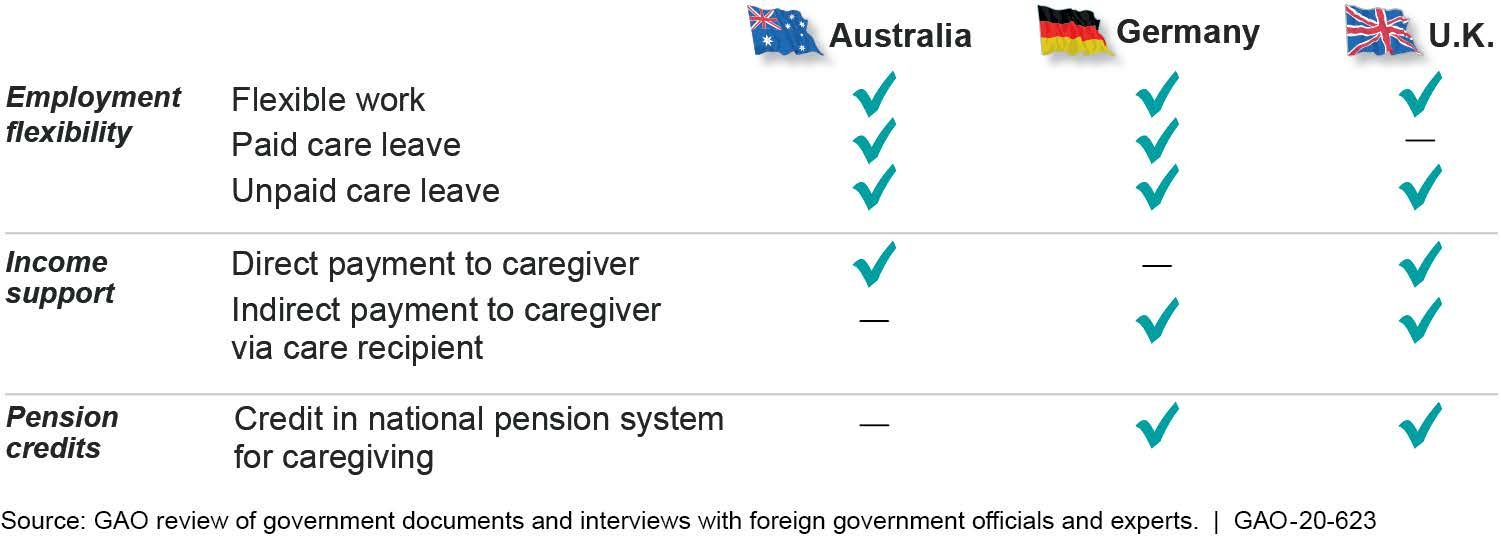Retirement Security: Other Countries' Experiences with Caregiver Policies
Fast Facts
Family caregivers play a critical role in supporting the elderly population, which is growing rapidly. However, those who provide eldercare may risk their own employment, income, and retirement security.
We looked at other countries' approaches to supporting family members who provide eldercare, and the U.S. Department of Health and Human Services' efforts to develop a U.S. family caregiving strategy. The 3 nations we examined sought to help caregivers stay attached to the workforce, supplement lost income, and save for retirement.

Highlights
What GAO Found
For over a decade, Australia, Germany, and the United Kingdom (UK) have developed and implemented national approaches—including strategies, laws, and policies—to support family caregivers, according to experts GAO interviewed. Specifically, experts noted that these efforts could help caregivers maintain workforce attachment, supplement lost income, and save for retirement. As a result, their retirement security could improve. For example, experts said:
Care leave allows employees to take time away from work for caregiving responsibilities. Australia's and Germany's policies allow for paid leave (10 days per year of work or instance of caregiving need, respectively), and all three countries allow for unpaid leave though the duration varies.
Caregivers can receive income for time spent caregiving. Australia and the UK provide direct payments to those who qualify. Germany provides indirect payments, whereby the care recipient receives an allowance, which they can pass on to their caregiver.
Other Countries' Policies to Support Caregivers

Experts in all three countries cited some challenges with caregiver support policies. For example, paid leave is not available to all workers in Germany, such as those who work for small firms. In Australia and the UK, experts said eligibility requirements for direct payments (e.g., limits on hours worked or earnings) can make it difficult for someone to work outside their caregiving role. Experts in all three countries said caregivers may be unaware of available supports. For example, identifying caregivers is a challenge in Australia and the UK.
As required under the RAISE Family Caregivers Act, the Department of Health and Human Services (HHS) convened the Family Caregiving Advisory Council (FCAC)—a stakeholder group that is to jointly develop a national family caregiving strategy. As of July 2020, HHS and the FCAC reported limited information on other countries' approaches, and neither entity had concrete plans to collect more. In September 2020, HHS officials provided sources they recently reviewed on selected policies in other countries, and they further noted that HHS staff, FCAC members, and collaborating partners have subject-matter expertise and bring perspectives about other countries' efforts into their discussions.
Why GAO Did This Study
Family caregivers play a critical role in supporting the elderly population, which is growing at a rapid rate worldwide. However, those who provide eldercare may risk their own long-term financial security. Other countries have implemented policies to support caregivers. In recognition of challenges caregivers face in the United States, Congress directed HHS, in consultation with other federal entities, to develop a national family caregiving strategy. GAO was asked to provide information about other countries' efforts that could improve the retirement security of parental and spousal caregivers.
This report examines (1) other countries' approaches to support family members who provide eldercare, (2) challenges of these approaches, and (3) the status of HHS' efforts to develop a national family caregiving strategy. GAO conducted case studies of three countries—Australia, Germany, and the United Kingdom—selected based on factors including rates of informal care (i.e., help provided to older family members or friends) and the types of policies they have that could improve caregivers' retirement security. GAO interviewed government officials and experts and reviewed relevant federal laws, research, and documents.
GAO's draft report recommended that HHS collect additional information about other countries' experiences. In response, in September 2020, HHS provided an update on its efforts to do so. As a result, GAO removed the recommendation and modified the report accordingly.
For more information, contact Tranchau (Kris) T. Nguyen at or nguyentt@gao.gov.
